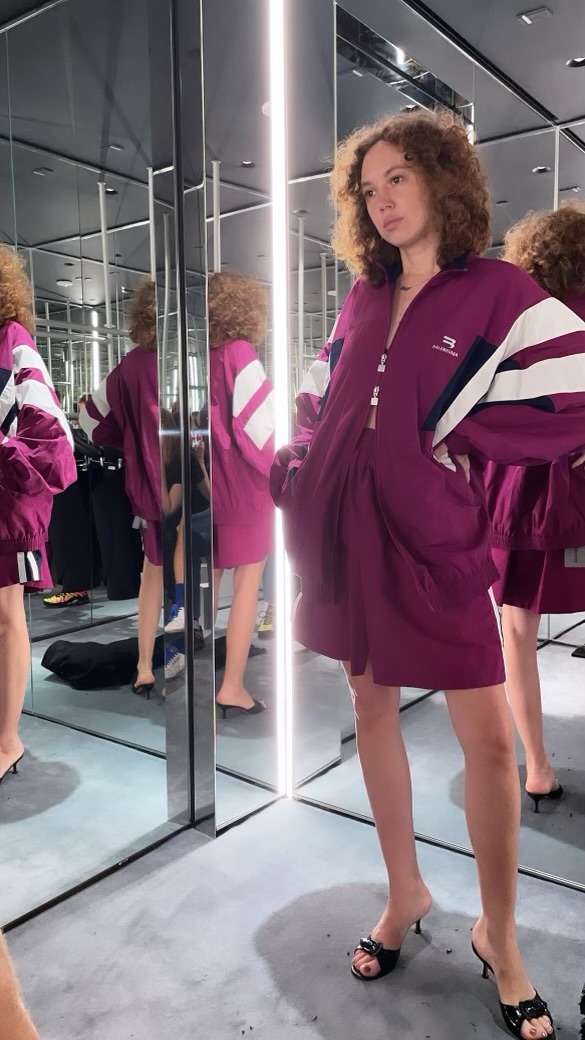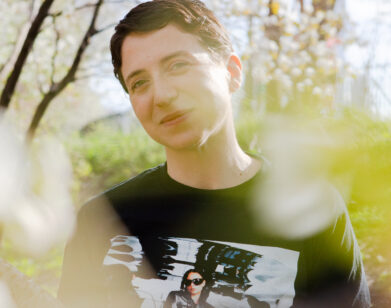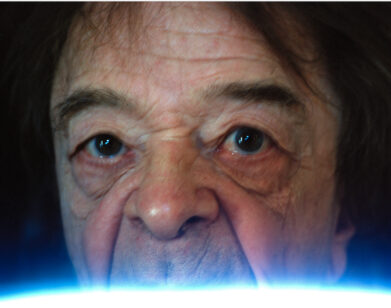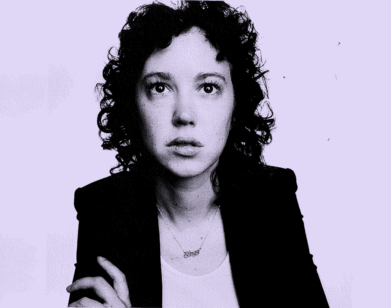LIT
Natasha Stagg on Fiction, Fuckboys, and Internet Fame

Natasha Stagg photographed by Kaitlin Phillips.
FRIDAY OCTOBER 13TH 4:05PM NYC
Last week, Natasha Stagg met with our senior editor over margaritas at Lucien to discuss her latest book, Artless: Stories 2019-2023, a coy collection of fiction, essays, and press releases that trace author’s pandemic-era experiences in New York’s art, fashion, and literary worlds. As in her debut novel Surveys, a story that traces the rise and fall of a social media-era “it” girl, Artless reflects our technologically mediated present in a way that feels both timeless and timely, but never didactic. Here, the writer shares her thoughts on TikTok, talking heads, and why she prefers cultural cachet over monetary wealth.
———
TAYLORE SCARABELLI: I’m out of it. I couldn’t sleep last night because I was reading all of the news. I was like, “What’s happening with Israel and Palestine?” Obviously we don’t need to get into politics, but I was thinking about it from a social media angle, everyone—
NATASHA STAGG: Everyone’s reacting.
SCARABELLI: Yeah.
STAGG: I try to not look at it, but then I’m like, “I wonder what my friends are saying.” And it’s kind of bizarre when you see it out of context. I don’t follow anybody, so I can’t look at feeds.
TAYLORE SCARABELLI: It’s messy out there. I was thinking about when I first read the pandemic-era stories in your book and I was like, “This feels too soon.” But with everything going on right now, it doesn’t feel too soon anymore.
STAGG: Oh, that’s interesting.
SCARABELLI: I think that we went through a time of just giving in and being like, “It’s the Biden-era! Everything’s chill!” And now it’s like, back to reality.
STAGG: Yeah, once Biden was president, everyone was like, “Okay, enough. We’re not screaming at each other anymore on the internet anymore.”
SCARABELLI: I also feel like people aren’t even critiquing social media anymore. There was a time when we were all talking about the impact of our online life on our day to day reality, and now it’s like we’ve just kind of succumbed to this way of being.
STAGG: I wonder if it’s just because it’s hard to keep talking about the same thing or if the social media that we were talking about has been made into the older version of social media anyway. We’re still on Instagram and Twitter, but—
SCARABELLI: Everyone’s on TikTok. We’re like the boomers on Facebook now.
STAGG: Yeah. Those things might as well be Facebook. So if you have to talk about social media, you have to talk about TikTok and I don’t even know what else.
SCARABELLI: I was flipping through all the livestream feeds on TikTok the other night. It’s just people just doing random shit, but it feels really intimate in this odd way. It gave me the creeps.
STAGG: The only time I ever see it is when somebody sends me something and it’s usually an explainer and I get really overwhelmed. It’s just like a little person in the corner of the screen talking and I’m like, “Why don’t you just send me the article that this person is pointing at?”
SCARABELLI: That’s the discourse now. [Laughs]
STAGG: I know, but I am so far removed from it. I don’t feel like that’s effective. It’s just a random Pee-wee’s Playhouse version of an article. Like a collage of words that are just being animated and pointed to.
SCARABELLI: I guess no one is worried about misinformation anymore. [Laughs] As someone who is now offline, how are you feeling about this book coming out, and doing press and all that?
STAGG: Yeah, that part is different from the last time. Although I don’t know if I’m totally offline. I just don’t have the capability of sharing.
SCARABELLI: You’re just not in a self-promotion mode.
STAGG: Yeah, and that’s, I think, fine. One reason I didn’t want to have Instagram or Twitter anymore was because I felt conflicted about what to self-promote and how much. I felt like it was maybe me overthinking, but then I was like, “You know what? Everybody thinks constantly about their image and my thoughts about my image are that it looks better for me to not share so much of myself.”
SCARABELLI: Also, maybe you made it to the point where you don’t need to self-promote. It’s kind of messed up, but writers are expected to be influencers these days. You’re expected to be able to go on a podcast and be funny and interesting and it’s like, “Well, wait, the whole reason that I’m a writer is because I can sit in my room and express myself without interacting directly with anyone.”
STAGG: I know. I am so self-conscious of that because I’ve been on a couple podcasts for the last book and then I listen to them and I’m like, “The way I talk has so many pauses. I’m not a comedian.”
SCARABELLI: That means you’re thinking. That’s good. [Laughs]
STAGG: It’s just like “Why would a writer be good at talking?” It shouldn’t necessarily translate, but it’s the way of the world now. Everybody has to be good at everything and that seems like a lot of pressure. I can’t imagine being really young right now and saying, “Well, I’d like to be a writer, but I’m not really good at self-promotion or being a talking head.” I never thought about that when I was deciding what I wanted to be when I grew up.
SCARABELLI: Are you worried about the longevity of your work on the internet?
STAGG: Yeah, I think about how this book and my last book must feel like time capsules, and that isn’t necessarily what most writers want to be doing. But at the same time, I think people really like reading time capsules. People like reading old magazines. It’s strange that we separate these things so much. Books are timeless, magazines are timed. But they don’t have to be.
SCARABELLI: Right.
STAGG: When I rewrite these stories to be in a book, I am trying to think of them as a book story instead of a magazine piece. Sometimes I just get sick of reading that thesis statement style.
SCARABELLI: But your essays are not didactic at all. It’s very much showing the reader your experience of something and allowing them to come to a conclusion on their own. Right now there seems to be an issue with nuanced writing, it’s like people can’t comprehend any gray areas. In my head there’s a division between fiction and nonfiction where fiction allows you to be less didactic, but I see that through line in all of your work.
STAGG: That’s good. I hope so.
SCARABELLI: And I guess that brings me to a question about moralizing in writing, and I’m just wondering how you avoid that.
STAGG: I mean, I hope I avoid it. I think it’s just so obnoxious to read. I guess sometimes it could be considered brave, if it’s not the majority opinion, but I just have never felt like I had the right answers for anybody. I don’t give advice generally. I think it’s really funny when people ask me for advice in terms of career stuff, ’cause I’m like, “Don’t look at me. I didn’t do anything the right way or get enough money for anything I’ve ever done.” Any job I’ve gotten is through friends.
SCARABELLI: Well, you do good work.
STAGG: I hope that’s what it is. I can’t consider myself the authority on anything. Not fashion, not art, not writing. And most of the things I’ve done kind of felt like treading water. I was always feeling like an outsider within the scene that I was, I guess, part of.
SCARABELLI: What drives you as a writer then?
STAGG: I used to want to be an insider in terms of fashion and publishing. And now, I would rather be where I am, which is writing from the fringe and feeling more honest about that. Everybody on the inside is super insecure about being there because either they were born into money so they could intern for years and years and then they’re already there, so why not stay? Or they weren’t born into money and so they feel like they can’t relate to these more high-minded people or social circles that are based on wealth. You can’t win and nobody admits that. So the best thing to do is just admit it.
SCARABELLI: In your introduction, you talk about contradicting yourself, to me that implies growth, but I think a lot of people expect writers to stay in whatever lane that people first related to them in.
STAGG: Yeah, I think a lot of writers feel limited by that. And you hear them talk about it and then they sound like complainers, but it’s true. You don’t want to be put in a box because the whole endeavor is supposed to be exploratory.
SCARABELLI: And I wonder if that’s gotten worse with social media.
STAGG: Probably. I mean, it feels like it can only get worse. Sometimes it sounds like I’m on acid when I say this, but as time moves forward, there’s only more history. It’s the weight of history crushing all of us. Every single person that is born into the world is born under an insane amount of history that only gets larger. And that seems very limiting in terms of creativity. There is nothing new to do because we’ve been doing this for so long. And social media is just a reminder that there is so much going on all the time.
SCARABELLI: I think there’s also just a specific type of writing that people relate to right now. Outrage culture really is successful. If you’re not taking some crazy stance, people get bored.
STAGG: Yeah, I mean that’s another reason why I can’t be on a podcast. I am not full of hot takes. I remember I was on Red Scare in 2019, and I looked at Reddit because there’s a little conversation about every episode, and mine was so short, there were hardly any comments. It was like, “She’s pretty boring.”
SCARABELLI: You’re not screaming and crying enough.
STAGG: I mean, I’m doing all that stuff in my writing, but it feels more under my control.
SCARABELLI: Who do you write for?
STAGG: I try to just write for myself. Another benefit of not being on social media is that I don’t get a bunch of DMs from random people. Because even though it felt really, really good to get a DM from somebody that was like, “I like your writing. You’ve inspired me.” Then I would be like, “Now I must write for you.”
SCARABELLI: I had the same thing happen to me. Now I don’t write anymore.
STAGG: [Laughs]
SCARABELLI: It’s scary that you could be disappointing someone.
STAGG: Yeah. And also you can’t tell how genuine everybody is. Maybe a lot of them are genuine, but of course a lot of them aren’t. They’re probably sending that same DM to everyone on their feed that has a job or some kind of clout that they could maybe do something with. I mean, some of them were scary, to be honest, but that’s—
SCARABELLI: Scary? In what way?
STAGG: Stalker-y. But I have a weird history of stalkers.
SCARABELLI: That makes sense because people feel like they know you through your writing.
STAGG: Yeah. But even before I was a writer, actually. I had a weird few instances where there was a stalker-ish scenario and I don’t know where that comes from.
SCARABELLI: Interesting.
STAGG: I think I kind of give a lot of myself right away and then I hold back. I get really walled off and I don’t know why I do that.
SCARABELLI: That’s like, fuckboy behavior.
STAGG: Exactly. I am, maybe, a fuckboy.
SCARABELLI: Yeah. Are you writing less or more than you used to? There’s a story in your book that’s about writer’s block—
STAGG: I don’t know if I’ve ever had a writer’s block. You know how you think some things don’t apply to you, even though they absolutely do? Like being an alcoholic or something?
SCARABELLI: [Laughs]
STAGG: It’s like, “Yeah, that’s not going to happen to me.” I’ve not written for months at a time. But I don’t know if that counts as writer’s block because I just don’t really care.
SCARABELLI: It’s more just like, “I’m not in the mood to write right now.”
STAGG: Yeah, I’ve never had a book deal, so I’ve never needed to close a deadline. I mean, I’ve had deadlines with magazines, but those are shorter pieces. It’s definitely harder to write something really good when it’s expected of you, and I get that feeling all the time.
SCARABELLI: But you are working on a novel.
STAGG: Yeah. That does have a deadline, I guess. Because we want to put it out next year at Semiotext(e). But I’m pretty close to done, I think.
SCARABELLI: I was going to say that you’re not lucky, but it’s great that you’re able to publish a book of stories so specific to the present.
STAGG: No, I am lucky because, because just like everything else, I’ve made the right friends. Chris Kraus is a great person for doing this. She’d rather it be experimental in its format. I mean, it was her idea to put the time stamp on it. And I think it’s smart because that makes it seem more self-aware. This is not to be read as a timeless book, even though it could be read forever, hopefully.
SCARABELLI: And you’re also you’re publishing with Semiotext(e), which has its own—
STAGG: Totally. No, that’s the main part of it, is the publisher itself has a built-in audience and it has a cachet that you don’t get from these bigger publishers that I would be jealous of if I weren’t me. I am definitely jealous of money. That’s the main thing that I’m jealous of all the time. Even if I’m rich, I’ll be jealous of other people that are more rich than me, but I do see the value in the opposite.
SCARABELLI: Yeah.
STAGG: I think I would choose that over money, probably.
SCARABELLI: Clout?
STAGG: The cachet that I have. I mean, I wasn’t given the choice, but I like it now. If I could see into the future both ways, I think I would like this better.





